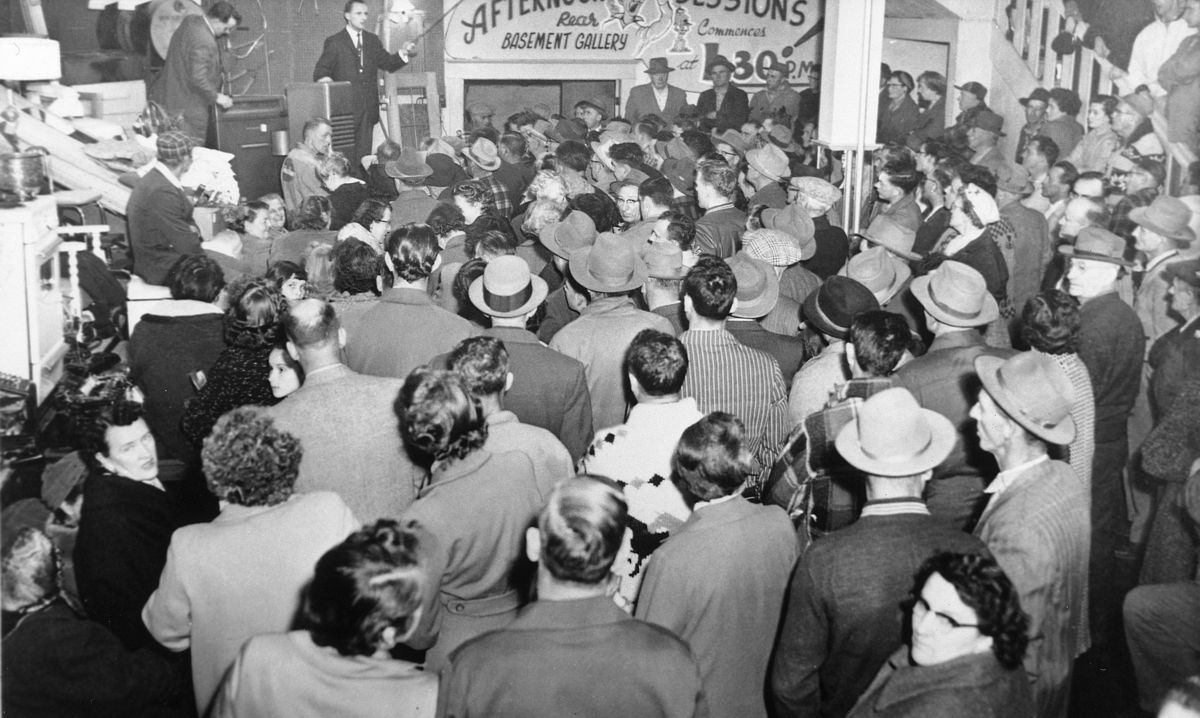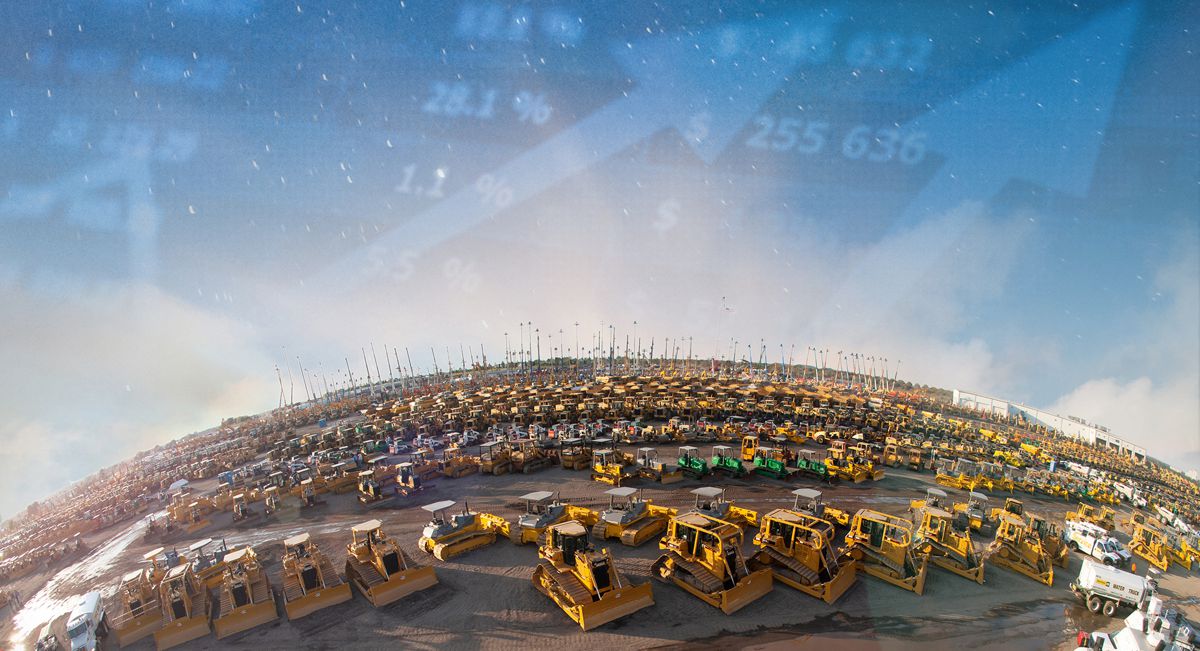Ritchie Bros. set to feature their transformation at bauma 2022
At bauma, Ritchie Bros. presents its journey from auction company to marketplace for insights, services, and sales solutions
Starting over 60 years ago as a small family-run auction business, the Ritchie Bros. of today offers a suite of services for heavy equipment owners, users, and sellers. These services now cover multiple stages in the equipment life cycle: from acquisition to disposition; through inventory management, parts procurement, and asset insights that drive better decisions.
The company’s origins as an equipment auction company defined its early years, but it has been driving change from day one. As we look to the future, we see a world where digital solutions are presented as an automated and integrated package powered by real-time connectivity.
Ritchie Bros. at bauma
After three years of anticipation, this October, Ritchie Bros. is heading to Munich, Germany to participate in the world’s largest construction equipment show. The company will showcase its transformation from an auction company to a one-stop shop for heavy equipment users and sellers who need to buy, manage, and sell assets.
Today, Ritchie Bros. helps its customers not only with buying and selling solutions, but also with market insights, asset valuation, fleet management solutions, and more. For this reason, multiple Ritchie Bros. brands – including SmartEquip, Rouse Analytics, Mascus, Marketplace-E and Ritchie Bros. Asset Solutions – will be represented at bauma alongside the company’s online auctions. During the week, bauma visitors can join several mini events at the Ritchie Bros. booth, including:
- Inside Edge live panel discussion: ‘The future of equipment management’ on Monday, October 24 at 3:30 PM
- Workshop: ‘Inventory Management & Price Discovery’ on Tuesday, October 25 at 11 AM
- Inside Edge live panel discussion: ‘Global supply and demand trends in construction equipment’ on Tuesday, October 25 at 3:30 PM
- Inside Edge live panel discussion: ‘Increasing uptime and smarter parts procurement’ on Wednesday, October 26 at 3:30 PM
More information, including a full event program, is available here.

The Ritchie Bros. journey
The company’s origins date back to 1958, with its first industrial auction taking place in 1963, just one year after the inaugural bauma. That first industrial auction, in British Columbia, Canada, racked up an incredible CA$663,000 worth of sales, marking the moment another big innovator in the construction industry was born.
While the company’s formative years were focused on auctions, it has always been at the forefront of driving change. To begin, its focus was on international expansion – first into the U.S. in 1970, then Europe in 1987, and then Asia, Australia, and the Middle East during the 1990s. By then, the company had also begun pioneering and exploring the possibilities offered by technology. In 1989, it became the first industrial auction company to enable remote bidding. Then in 1996, the Ritchie Bros. website was launched, featuring a searchable database of available equipment. The following years the company broadcasted an auction online for the first time and introduced real-time internet bidding.
Over the last decade, alongside the global expansion and evolution of technology, a series of strategic acquisitions took place, including Mascus in 2016 and IronPlanet in 2017.
Doing business in the modern world
For decades Ritchie Bros.’ core business was live auctions, with yards filled with heavy equipment and the ramp-and-stage approach for bidder convenience. Today, while the equipment auction events remain an essential part of Ritchie Bros.’ business, there are multiple options that allow buyers and sellers to think more strategically about acquisition and disposition. Offering the right types of sales channels allows equipment sellers and buyers to do business in the way that works best for them. Instead of a one-size-fits-all solution, they can explore multiple ways of operating, according to their preferred criteria around timing, price, and convenience.
While Ritchie Bros. Auctioneers covers the unreserved auctions, Ritchie List (USA) and Mascus (Europe) take a modern online classified ads approach, where sellers can easily list their own items and buyers having access to hundreds of thousands of items at any given time.
One of the company’s fastest growing solutions is Marketplace-E, an online sales channel that is a hybrid between ad listings and auctions. Just in the first seven months of 2022, it saw a 57% increase in machines sold across the EMEA region. A major factor in its success is the selling assistance that advises customers, helps them post listings, negotiates the selling price and handles buyer enquiries. The Marketplace-E format offers reassurance, especially for higher value items as is reflected in some of this year’s sales which included a Liebherr 202 ECB tower crane which sold for €240,000 and an Atlas Copco Boomer 282 4×4 Jumbo Drill, which went for €216,000. Whichever solution is chosen, customers can leverage the benefit of industry-leading market intel, decades of experience, and a global seller and buyer network.
Modern equipment management
A decade ago, Ritchie Bros. primarily came into the picture when equipment needed to change hands. Today there are more services available to owners that want to make better data-driven decisions during and towards the end of the equipment lifecycle. Ritchie Bros. Asset Solutions, launched in 2018, is a software tool that empowers businesses to track assets with real-time market valuations, get inspections and appraisal services, and easily workflow equipment and truck inventory to multiple disposition channels. It uses advanced algorithms to analyse and organize data entered through marketplace applications, or integrations with the customer’s own ERP systems.
Add to this, the 2020 acquisition of equipment market intelligence leader Rouse – which has a suite of data-driven solutions, such as Rouse Analytics that tracks millions of equipment transactions and provides real-time asset valuation, utilization metrics, and more.
Ritchie Bros. aims to simplify and automate equipment services. This includes parts procurement, which has been taken to an incredible new level following the 2021 acquisition of SmartEquip, a company devoted to increasing uptime and decreasing unnecessary costs and inefficiencies. Simplifying and speeding up the identification and sourcing of the correct parts, the service can even enable smaller players to embrace the same metrics-driven approach as the industry leaders – often leading to even greater gains.
Once it’s time for equipment to be moved on, the marketplace provides access to a huge global buyer base and offers a variety of selling options. Customers can sell on their own or via an online 24/7 marketplace with price control and selling support, or via public and private auctions. Sales experts, together with intelligent data tools, enable customers to identify the optimal way to sell assets and maximize the return on their equipment.
For buyers, the trusted and secure Ritchie Bros. ecommerce websites simplify the process of searching, inspecting, and purchasing machinery, whether online or at their local yard. From the moment of purchase, they have easy access to complementary services such as financing, shipping, refurbishing, and more.

Where to next?
Currently, this suite of services operates relatively independent from one another, but Ritchie Bros.’ vision is to use its IMS-based ecosystem as a means of connecting them altogether. This provides exciting, profitable customer benefits through an increasingly seamless and integrated equipment management environment.
As IoT technologies, in combination with better data and enhanced data analysis, continue to open new possibilities, Ritchie Bros. will continue to focus on helping machine owners and users get more out of their equipment. But while the digital evolution continues, the company will not forget its roots in live auctions. In fact, it has added multiple local physical equipment yards to be closer to customers for faster and more personalized services.




























